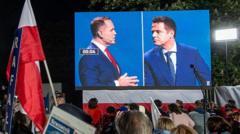Amidst public frustration with entrenched political parties, Poland prepares for a pivotal presidential election with liberal and conservative candidates leading the race.
Poland Faces Pivotal Presidential Election as Voter Discontent Grows

Poland Faces Pivotal Presidential Election as Voter Discontent Grows
With a decade of Duda, Polish voters gear up for a possibly divisive presidential election, highlighting deep-rooted political fatigue.
As Poland approaches its presidential election on Sunday, a fierce competition is expected, potentially leading to a run-off between Rafal Trzaskowski, the liberal mayor of Warsaw, and Karol Nawrocki, a national-conservative historian. The latest opinion polls suggest a lack of consensus, with Trzaskowski, backed by the centre-right Civic Platform (PO), currently leading Nawrocki, who represents the opposition Law and Justice (PiS) party. This election is crucial; the president holds veto power over government bills, making the outcome particularly significant as outgoing President Andrzej Duda steps down after two consecutive terms.
In recent years, Polish politics has seen the dominance of the PiS party, criticized for authoritarian measures and media manipulation. Analysts have portrayed the ascent of Donald Tusk's coalition as a return to liberal democracy. Nonetheless, Tusk himself has faced accusations of overstepping his campaign promises, particularly regarding issues such as migration policy and abortion rights, leading some to view the political landscape as a choice between authoritarianism and a hypocritical liberal populism.
The political discourse in Poland has shifted dramatically since Russia's conflict with Ukraine, drawing attention to national security and military preparedness. Tusk's government has pledged significant military investments, which have become focal points of their campaign, alongside addressing immigration. However, both candidates face scrutiny over their messaging and ability to deliver meaningful reforms.
Interestingly, an emerging trend among voters reflects a growing discontent with the traditional two-party system that has dominated Polish politics for decades. Alternative candidates, such as far-right libertarian Slawomir Mentzen, have challenged the status quo, albeit with mixed success. Voters express a strong desire for change, citing a mix of frustration with populism and the lack of substantive dialogue on critical issues.
As Poland gears up for its presidential race, the outcome remains uncertain, with potential ripple effects across the political spectrum, highlighting a crucial moment for the nation's future direction and governance. The election serves not just as a measure of public sentiment but will also shape the country's political landscape for the coming years.






















